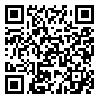BibTeX | RIS | EndNote | Medlars | ProCite | Reference Manager | RefWorks
Send citation to:
URL: http://jdisabilstud.org/article-1-3194-fa.html

 ، بهرام میرزائیان*2
، بهرام میرزائیان*2 
 ، قدرت اله عباسی3
، قدرت اله عباسی3 

2- استادیار، گروه روانشناسی، واحد ساری، دانشگاه آزاد اسلامی، ساری، ایران
3- دانشیار، گروه روانشناسی، واحد ساری، دانشگاه آزاد اسلامی، ساری، ایران
چکیده
زمینه و هدف: نقش هیجانات و پریشانی در سیر بالینی بسیاری از بیماریهای مزمن تأیید شده است. پژوهش حاضر باهدف بررسی اثربخشی آموزش کاهش استرس مبتنیبر ذهنآگاهی بر تنظیم شناختی هیجان و تحمل پریشانی در زنان مبتلا به سرطان پستان انجام شد.
روشبررسی: روش پژوهش نیمهآزمایشی با طرح پیشآزمون و پسآزمون و گروه گواه بههمراه دورهٔ پیگیری سهماهه بود. جامعهٔ آماری را زنان مبتلا به سرطان پستان تشکیل دادند که در سال ۱۴۰۱ به کلینیک خصوصی در تهران مراجعه کردند. سی نفر بهروش هدفمند و بهصورت داوطلبانه وارد مطالعه شدند و بهطور تصادفی در دو گروه پانزدهنفری (آزمایش و گواه) قرار گرفتند. گروه آزمایش طی هشت جلسه درمان کاهش استرس مبتنیبر ذهنآگاهی (سگال و همکاران، ۲۰۰۲) را دریافت کرد. پرسشنامهٔ تنظیم شناختی هیجان (گارنفسکی و کرایج، ۲۰۰۶) و مقیاس تحمل پریشانی (سیمونز و گاهر، ۲۰۰۵) قبل و بعد از آموزش و سه ماه بعد، برای دو گروه اجرا شد. تحلیل دادهها بااستفاده از آزمون تحلیل واریانس با اندازهگیری مکرر و آزمون تعقیبی بونفرونی در نرمافزار SPSS نسخهٔ ۲۶ صورت گرفت. سطح معناداری آزمونها ۰٫۰۵ بود.
یافتهها: اثر گروه بر متغیرهای راهبردهای سازشیافته (۰٫۰۰۱>p) و راهبردهای سازشنیافته (۰٫۰۰۱>p) و تحمل پریشانی (۰٫۰۳۳=p) و اثر زمان بر این متغیرها (۰٫۰۰۱>p) معنادار بود. در سه متغیر مذکور در گروه آزمایش، تفاوت بین میانگین نمرات پیشآزمون با پسآزمون و پیگیری معنادار بود (۰٫۰۰۱>p)؛ اما تفاوت بین میانگین نمرات پسآزمون و پیگیری در متغیرهای راهبردهای سازشیافته (۰٫۰۸۸=p) و راهبردهای سازشنیافته (۰٫۱۲۵=p) و تحمل پریشانی (۰٫۰۹۰=p) معنادار نبود که نشان داد اثر آموزش کاهش استرس مبتنیبر ذهنآگاهی بر این متغیرها در دورهٔ پیگیری سهماهه حفظ شد.
نتیجهگیری: باتوجه به نتایج، مداخلهٔ غیردارویی کاهش استرس مبتنیبر ذهنآگاهی بر بهبود تنظیم شناختی هیجان و تحمل پریشانی در بیماران مبتلا به سرطان پستان مؤثر است؛ لذا بهکارگیری برنامهٔ کاهش استرس مبتنیبر ذهنآگاهی در مراکز درمانی توصیه میشود.
| بازنشر اطلاعات | |
 |
این مقاله تحت شرایط Creative Commons Attribution-NonCommercial 4.0 International License قابل بازنشر است. |


